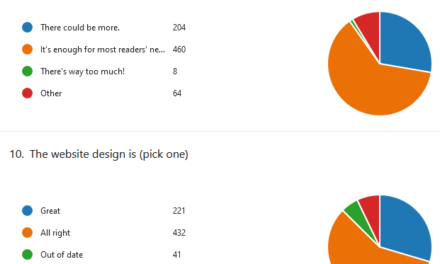Nicola Mason: It’s Trepidation Day here at the mag—the day we designated to make it known that we are (deep breath) shortening our reading period. We’ve gone back and forth. There’s been heated discussion. Fisticuffs, even. Okay, not fisticuffs, but brow furrowing and such. Definitely brow furrowing and one incipient case of TMJ. In other words, we don’t want to do it, but we have to do it. Weirdly, it’s to be fair to all the talented writers submitting—who are waiting longer and longer to hear from us because of the steadily climbing number of quality manuscripts we receive. Each day we get an email from an irritated, perhaps slightly more than irritated, writer whose work has been under consideration for, basically, ever. This most often means that one reader dug it and passed it on to someone else, who dug it and passed it on to someone else (repeat two more times), and it has reached the head eds, who must read it, and maybe even reread it, before deciding if it goes into the upcoming issue. Sad to say (reality rears its pattern-bald pate) we can publish less than 1% of what we receive.
We most definitely don’t want to speed up the actual process of reading submissions. We don’t want to give anything short shrift. In fact, we rather pride ourselves on supporting that underserved set of writers, the emergers. We are excited, for example, to have discovered John William McConnell’s story “House of Wine,” forthcoming in our fall/winter issue. It’s his first publication, and it’s amazing. We are painfully aware, however, that we are not being kind to hold onto the work—for, basically, ever—of wonderful writers who are trying to take the lit world by the nape and give it a sharp shake. In other words, to be fair to those who submit, we have to restrict the number of submissions we receive. We realize this is something of a catch-22, and that there will be strong feelings and opinions about our long-considered and considerably fraught decision.
Of course, we would love for some beneficent donor to appear before us with a sack of crisp bills so we could a.) work full time, or b.) hire more kick-ass staffers. If you know such a person—if you ARE such a person—we’d be thrilled to hear from you. In the meantime, we are shortening our reading period—with regret—in the hope that we will be more speedily responsive in the future.
I leave you with this delightful passage from the story mentioned above. Thanks, John William McConnell, for sending your stuff our way.
John’s mind jump-started awake. Lilith asleep next to him, snoring. Dim bars of light leaned across the bedroom, beamed through the slats from a disco-ball moon. John immediately understood he would not be sleeping that night, only by the sobriety of his awakeness, its painful edge and the ache behind his eyes.
John frowzed upright and frowzed his brow; he frowzed, then frowzed his eyes and frowzily frowzed out of bed. He really wanted to utter an obscenity but had forgotten them all. He pulled on his pants and shuffled around shirtless in a world of gunmetal blue, and gray, and lurking blacknesses in the corners. Out of the bedroom. Through a blank hall. To a menagerie of couches and furniture that had borrowed from the night a glister of comatose hate. Fuck you, said the couches. On the table was a bottle of wine, number four, and praise the lord: still half full. He poured into a glass and raised it. There was very red lipstick on the rim. Lip, John thought. John glanced around. What the fuck was this? He just wanted to. Yeah, he was gonna do it. John pressed his mouth over the lipstick, her lipstick, cherryblood red. Drank the wine with his mouth precisely over the lipstick and enjoyed the lipid roundness of the stuff adhering to his mouth. The sticky fat. He held the glass and listened. Sometimes there was the shorelike sound of a car spinning around the cul-de-sac, lost in the suburbs, probably, and how the high beams arced like the flash of a lighthouse through the windows. Vase, picture, couch, plant. He drank again, smacked his mouth.










